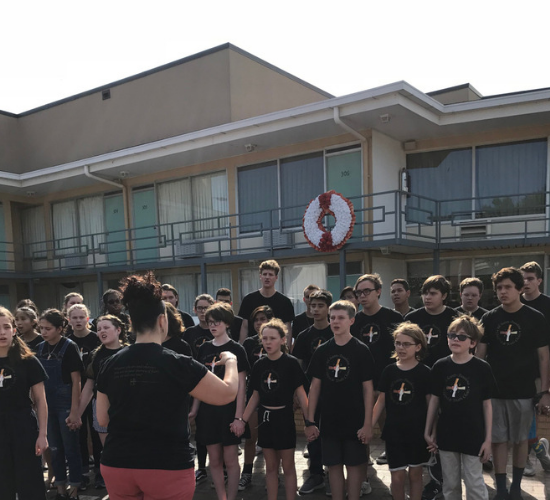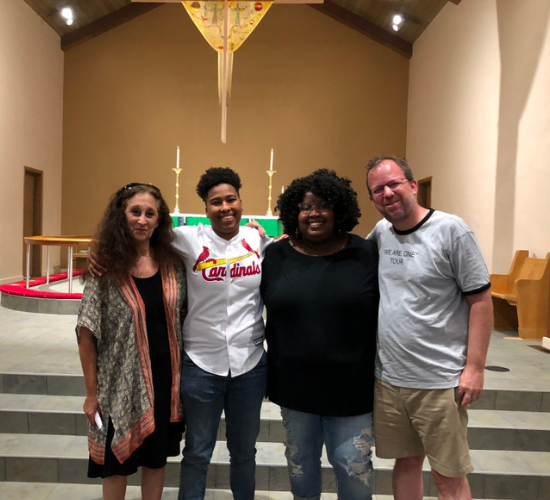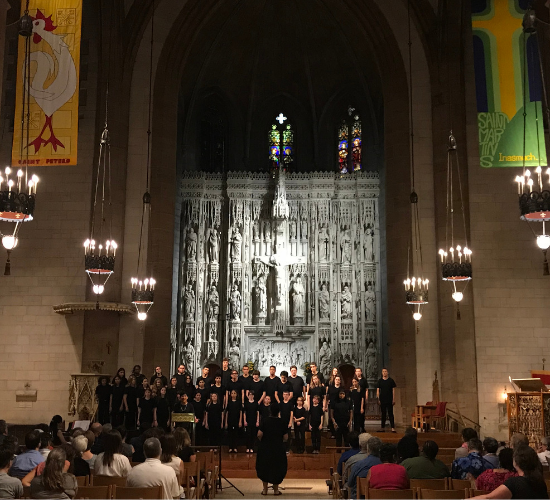For this church youth choir, connecting civil rights history to current events happened through sharing music, and taking the time to listen and learn.

During the summer of 2018, the All Saints Trouvères from All Saints Episcopal Church in Pasadena, California embarked upon an incredibly challenging, illuminating, and ultimately hopeful concert tour.
In developing the tour, choir director Jenny Tisi had been inspired by the stories of Estonia’s “The Singing Revolution,” remembered in the context of our struggles here in the US today. “I thought about my choristers,” she said, “And the healing power they bring to me and our congregation and it got me thinking: How can I help to heal my country through choral music?”
She found an answer in a 10-day “We Are One” concert tour of hope, healing and unity throughout the American South, retracing the steps of the Civil Rights Movement of the 1960s and learning more about current issues of social justice.
Their first stop was Montgomery, Alabama, where they visited the Legacy Museum and the National Memorial for Peace and Justice, honoring the memory of thousands of African-American victims of lynching. They continued to Birmingham, where they visited the Civil Rights Institute and the Sixteenth Street Baptist Church, which still bears the scars of a 1963 white supremacist bombing which killed four young black girls. It was in Birmingham they first performed, in a concert which included pieces such as “We Are Not Alone”, “MLK”, “The Storm is Passing Over” and “Glory” (from the film “Selma”).
The group’s final stop in Alabama was the town of Selma, a key location in the Civil Rights struggle. First, they visited Brown Chapel African Methodist Episcopal Church, which played a major role in the events that led to the adoption of the Voting Rights Act of 1965. Civil Rights historian Joyce O’Neill shared her experiences in the historic movement, and the choir serenaded her in return. Then, they heard stories from Civil Rights participant Joanne Bland, to which they responded with an impromptu performance of the song “MLK.”
Jenny remembered: “Joanne sobbed into her hands when we were finished. She simply looked up at us afterwards and said, ‘You are the ones we have been waiting for.’ Our kids said, ‘We just cannot let her down now.’ They were forever changed.”
Next, the choir marched in complete silence across the Edmund Pettus Bridge, retracing the route that freedom marchers attempted once, were met with police teargas, and then successfully completed, in 1965.
Then it was time to hit the road for a brief visit to New Orleans, before landing in Memphis, Tennessee. There, they visited the Slave Haven Underground Railroad Museum and the Rock ‘n’ Soul Museum, with its emphasis on music’s role in the Civil Rights movement. A highlight was performing at the National Civil Rights Museum, at the very spot beneath the balcony where Dr. Martin Luther King Jr. was assassinated. The gravitas of that place and time was not lost on the choir, and they sang with reverence and solemnity in memory and honor of Dr. King.
“As we went along our journey, with each bit of knowledge we gained, the voices of our youth soared and each concert sounded different, not just because of the venue, but because we were changed – gutted, horrified, and blessed beyond measure,” Jenny noted.
The final stop was St Louis, Missouri, where they visited and serenaded some historic spots such as the Gateway Arch and the Old Courthouse. But it was here that the group chose to also focus on current events and issues in the community.
Following a visit to the memorial site for Michael Brown in Ferguson, the choir met with local Black Lives Matter activists Alexis Templeton and Kayla Reed, who organize the local nonprofit Action STL (formerly the St Louis Action Council).

Action STL is a black-led grassroots organization committed to year-round political education, which at the time was focused on ousting incumbent St Louis County Prosecuting Attorney Robert McCullough, who in 2014 decided that his office wouldn’t file charges against the white police officer who shot and killed Brown, a young black man. The Trouvères were so inspired that they donated all proceeds from their concert at Christ Church Cathedral the following evening to the St Louis Action Council.

The choristers returned to their lives in Pasadena with a more profound understanding of our country’s past and a greater degree of social and political awareness. But though their tour came to an end, they didn’t stop learning and following current events. Through a facebook group set up for the tour, they share articles and resources that are relevant to the ongoing discussion – including a bit of good news they’d worked towards with their concert donations. During the 2018 election in St Louis County, the Prosecuting Attorney had not been re-elected, but rather, had lost his position to Wesley Bell, a young black Ferguson city council member. Seeing tangible results of grassroots actions is just one of many examples of how “We Are One” concert tour formed these young musicians for life.
Photos courtesy of Jenny Tisi and Emily Henriksen

